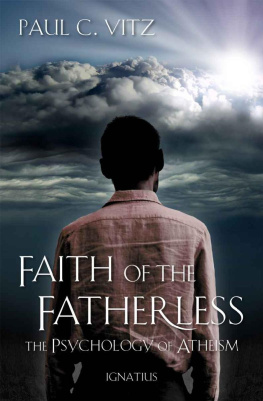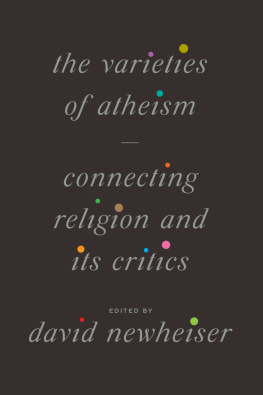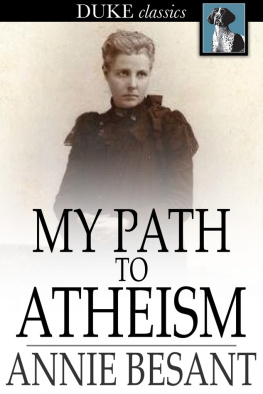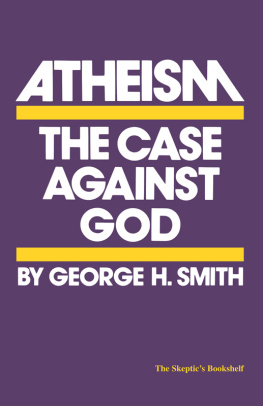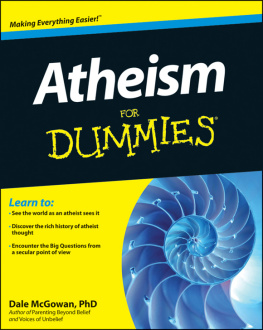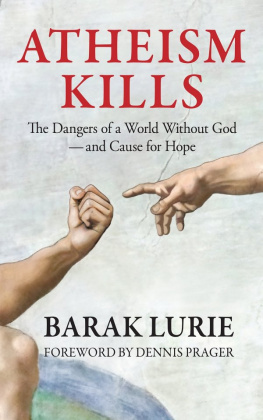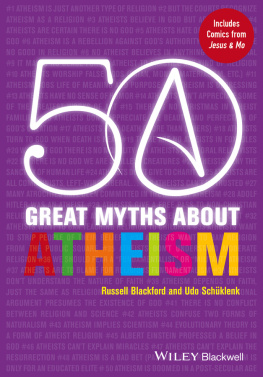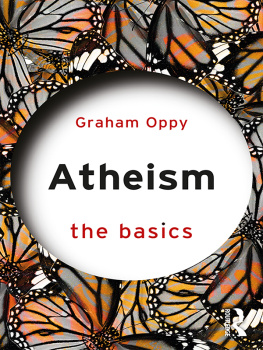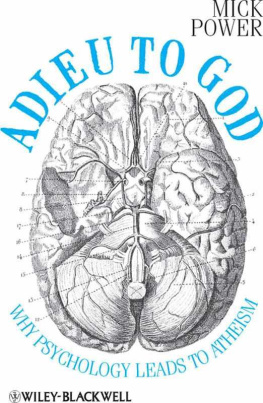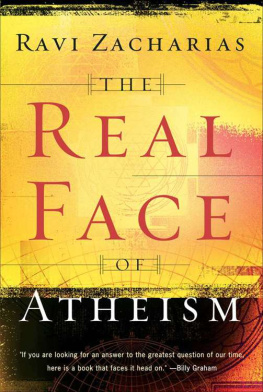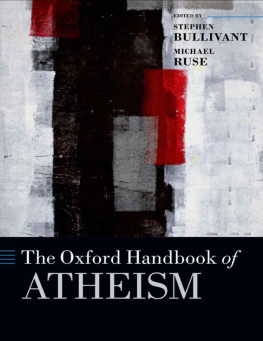FAITH OF THE FATHERLESS
PAUL C. VITZ
Faith of the Fatherless
THE PSYCHOLOGY OF ATHEISM
Second Edition
IGNATIUS PRESS SAN FRANCISCO
First edition published by
Spence Publishing Company, Dallas, Texas
1999 by Paul C. Vitz
Cover art and design by Milo Persic
2013 by Ignatius Press, San Francisco
All rights reserved
ISBN 978-1-58617-687-7
Library of Congress Control Number 2013930575
Printed in the United States of America
This book is dedicated with love to my children:
Rebecca, Jessica, Daniel, Peter, Michael, and Anna, and now especially also to my grandchildren.
Contents
PART ONE
ATHEISTS, THEISTS, AND THEIR FATHERS
The Projection Theory of Belief in God
Freuds Unacknowledged Theory of Unbelief: Oedipal Atheism
A New Theory of Atheism: The Defective Father Hypothesis
An Extension of the Theory: The Attachment Insecurity Hypothesis
Attachment and Religiousness
Attachment and Unbelief
Dead Fathers
Friedrich Nietzsche
David Hume
Bertrand Russell
Jean-Paul Sartre
Albert Camus
Arthur Schopenhauer
Abusive and Weak Fathers
Thomas Hobbes
Jean Meslier
Voltaire
Jean dAlembert
Baron dHolbach
Ludwig Feuerbach
Samuel Butler
Sigmund Freud
H. G. Wells
Minor Atheists
John Toland
Robert Taylor
Richard Carlile
Contemporary Atheists
Albert Ellis
Madalyn Murray OHair
The New Atheists
Richard Dawkins
Daniel Dennett
Christopher Hitchens
Theist Control Group
Blaise Pascal
George Berkeley
Joseph Butler
Thomas Reid
Edmund Burke
Moses Mendelssohn
William Paley
William Wilberforce
Franois Ren de Chateaubriand
Friedrich Schleiermacher
John Henry Newman
Alexis de Tocqueville
Samuel Wilberforce
Sren Kierkegaard
Baron Friedrich von Hgel
G. K. Chesterton
Albert Schweitzer
Martin Buber
Karl Barth
Dietrich Bonhoeffer
Abraham Heschel
Summary
Substitute Fathers
Don Bosco
Hilaire Belloc
Walker Percy
Political Atheists
Joseph Stalin
Adolf Hitler
Mao Zedong
The Atheist Father as a Positive Influence: James Mill and John Stuart Mill
Men and Women: Some Differences
Ayn Rand
Simone de Beauvoir
Jill Johnston
Kate Millett
Exceptions?
Denis Diderot
Karl Marx
Sam Harris
Other Psychologies of Unbelief
PART TWO
OTHER RELATED PSYCHOLOGIES OF UNBELIEF
General Socialization
Specific Socialization
Personal Independence
Personal Convenience
Another Exemplary Case: Mortimer Adler (1902-2001)
Autism Spectrum Disorder
ASD and Religion
The Positive Significance of Atheism for Believers
Historical Considerations
Intelligence and Ambition
Resentment and Will
Preface to the Second Edition
Only as it reaches its extremes can we see how strange the modern world has become. It is natural that such extremes are needed for the characteristics of the modern to become obvious, and nothing has been more typical of public life than the presumption of atheism. God has been banished from public discourse so thoroughly that in todays high schools we teach about condoms and masturbation, but are legally prohibited from making reference to the Deity
The rejection of God in our schools is just one small example of the triumph of atheism. That such a rejection of God should have triumphed is quite remarkableeven bizarre. After all, the United States has long been known as a seriously religious country. In the 1840s, Alexis de Tocqueville clearly identified the profoundly religious character of the United States:
America is still the place where the Christian religion has kept the greatest real power over mens souls.... The religious atmosphere of the country was the first thing that struck me upon arrival in the United States.... Religion, which never intervenes directly in the government of society, should therefore be considered as the first of [Americas] political institutions.
James Turner, a historian who has studied the origins of atheism in Western society and in America in particular, has pointed out that the known unbelievers of Europe and America before the French Revolution [1789] numbered fewer than a dozen or two. For disbelief in God remained scarcely more plausible than disbelief in gravity. Not until the past half-century has it become a predominant public assumption.
Yet even throughout these last fifty yearswhich is as long as the Gallup Poll
In the academic world, serious reference to God in scholarly writingnot to mention the use of notions like Providence is altogether taboo. Abstract secular concepts such as progress, class warfare, patriarchal society, self-actualization along with other often equally vague references to biological mechanisms, survival of the fittest , and evolution are, however, pervasive and accepted. The situation in the academy is such that to refer to God in any serious way would bring the legitimacy of ones scholarship into question.
In general, historians agree that explicit, systematic, and public atheism is a recent and distinctively Western phenomenon and that probably no other culture has manifested such a widespread public rejection of the divine. In view of the suddenness of the public shift from accepted belief to accepted unbelief, in view of its rarity in the historical record of other cultures, and in view of the continued high prevalence of private belief in God, atheism needs to be examined and much more fully explained or understood.
The importance of atheism is, I trust, obvious since it constitutes a major determinant of a persons worldview.
In contrast, the worldview of those who reject God creates problems like meaninglessness and the alienation of modern life that many report these days. Atheism, of course, has been a central assumption of many modern ideologies and intellectual movementscommunism, socialism, much of modern philosophy, most of contemporary psychology, and materialistic science. Indeed, I will take it for granted that atheism is one of the distinctive features of what is meant by the modern.
Now some might say that the reason for the dominance of atheism is that it is true: there is no God. I will address some aspects of this question but primarily from a psychological perspective. For now, let me simply point out that although it may be possible to prove the existence of God, it is clearly impossible to prove the nonexistence of Godsince to prove the nonexistence of anything is intrinsically impossible. In other words, atheism is an assumption made by certain people about the nature of the world, and these people have been, in the past century, extraordinarily successful at controlling the acceptable view on the matter. In particular, there seems to be a widespread assumption, throughout much of our intellectual community, that belief in God is based on all kinds of irrational, immature needs and wishes, whereas atheism or skepticism flows from a rational, grownup, no-nonsense view of things as they really are.
To challenge the psychology of this viewpoint is the primary concern of this book. As I present the evidence from the lives of atheists, I will be looking for regularities, for patterns that distinguish their lives and psychology from those of a comparable group of theists or, in the case of autism, from people in general.
There are three new topics that are quite relevant to the psychology of atheism that have come to prominence since I was collecting evidence and preparing the first edition of this book, published in 1999. They constitute the major reasons for this new edition.
Next page
